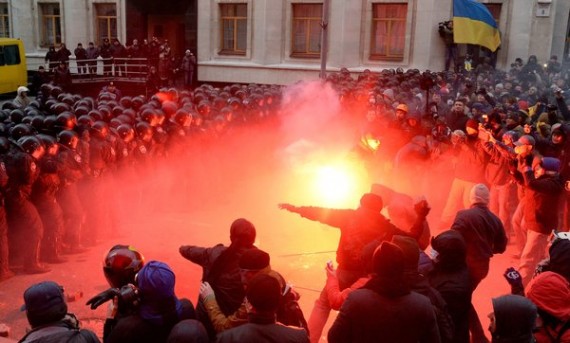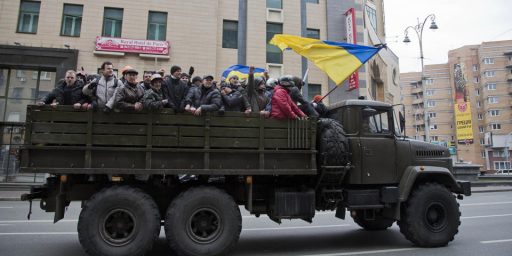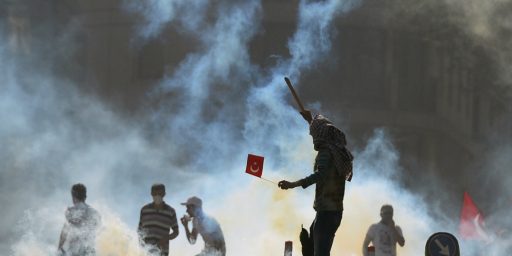Anti-Government Protests Hit Ukraine
Ukraine was gripped yesterday by massive anti-government protests inspired by tensions over the nation’s ties to Europe and Russia and security crackdowns:
KIEV, Ukraine — Enraged by a violent crackdown by security forces, Ukrainians took to the streets with new, revolutionary urgency on Sunday, with hundreds of thousands of protesters demanding the resignation of President Viktor F. Yanukovich and a realignment of the country away from Russia toward Europe.
“I want the authorities to know that this is not a protest; this is a revolution!” Yuri V. Lutsenko, a former interior minister and an organizer of the Orange Revolution nine years ago, told a vast crowd here in Independence Square that many observers said outstripped even the biggest gatherings in 2004.
“Revolution!” the crowd roared back. “Revolution!”
Eleven days of intensifying protests over Mr. Yanukovich’s refusal to sign political and free trade accords with the European Union have now directly shaken the president’s prospects of remaining in power. Cracks have begun to emerge in his political base: His chief of administration was reported to have resigned, and a few members of Parliament quit his party and decried the police violence.
Many Ukrainians see the agreements with Europe as crucial steps toward a brighter economic and political future, and as a way to break free from the grip of Russia and from Ukraine’s Soviet past. Now, the outcry over Mr. Yanukovich’s abandonment of the accords is pushing Russia into a corner.
The Kremlin, which has supported Mr. Yanukovich as a geopolitical ally for years despite its frequent annoyance with him, used aggressive pressure to persuade him not to sign the accords. Now the anger over Russia’s role has made it all but impossible for Mr. Yanukovich to take the alternative offered by the Kremlin — joining a customs union with Russia, Belarus and Kazakhstan. Any compromise with the protesters would have to revive the accords with Europe, and reduce Russia’s sway.
Even as Mr. Yanukovich was said to be considering declaring a state of emergency, parliamentary leaders began contemplating various ways to curtail his powers, rather than remove him from office entirely. Volodymy Rybak, the speaker of the Parliament, which is controlled by Mr. Yanukovich’s Party of Regions, on Sunday called for “round-table talks” to help resolve the crisis. Similar talks were conducted in 2004 to resolve the disputes that set off the Orange Revolution.
The steady escalation of the protests — and the threat of further violent crackdowns — has created a volatile situation that showed no sign of abating.
More violence erupted on Sunday afternoon when demonstrators clashed with a battalion of police officers guarding the presidential administration building. Smoke bombs and stun grenades were set off, and the police responded with tear gas.
The authorities reported Sunday night that about a hundred police officers and more than 50 protesters were injured, including some with burns to their eyes from tear gas. Witnesses said that some protesters, including women, were beaten brutally.
The police made scattered arrests, but did not immediately release a tally.
Protest leaders said they intended to make Mr. Yanukovich a prisoner in his own capital on Monday, with streets blocked, government buildings surrounded or occupied and possibly a general strike by workers and students. A map was posted on Facebook showing supporters where to put their vehicles to obstruct traffic.
By Sunday evening, demonstrators had taken police barriers meant to keep them out of Independence Square and repositioned them to mark their own control of a large area in the city center.
There were demonstrations in cities like Lviv and Chernivtsi, in the generally pro-European western part of Ukraine, and also in the predominantly Russian-speaking east, which tends to favor close ties with Moscow and where Mr. Yanukovich has his main base of support. Several thousand people rallied in Dnipropetrovsk in the southeast, defying a court order banning a protest there. Even in Donetsk, Mr. Yanukovich’s hometown in the east, hundreds rallied in favor of European integration.
This story is getting little coverage in the American media, so it’s hard to say what today’s protests have been like even though its already early afternoon in Kiev as I write this. There is, however, this report from the BBC:
Demonstrators are blockading government buildings in the Ukrainian capital Kiev, as they step up their campaign for the resignation of the government.
Protesters have put up barricades on Independence Square, while others are entrenched inside city hall.
The unrest was triggered in November by President Viktor Yanukovych’s refusal to sign a deal on closer EU ties.
Opposition leaders have renewed demands that he stand down, and urged him to “stop political repression”.
The call was issued on Monday at a meeting convened by parliamentary Speaker Volodymyr Rybak, the Ukrainska Pravda news website reported.
The opposition leaders refused to speak to Mr Rybak directly, the site added.
They also demanded the release of the jailed former Prime Minister Yulia Tymoshenko – who has been convicted of abuse of power.
On Sunday Mr Rybak had said President Yanukovych was “on the side of the people who are fully entitled to assemble for peaceful demonstrations and to express their views”.
Overnight hundreds of people put up tents on Independence Square, amid calls for a general strike.
The headquarters of the cabinet has been blockaded, with government employees unable to reach work.
Police reinforcements are being sent to Kiev, Ukrainska Pravda reported.
As thousands of protesters converged on Independence Square on Monday they chanted slogans including “Out with the gang!”
So, it looks like Independence Square in Kiev is going to end up being the focal point of these protests. Where it goes from there, of course, is still an open question.






Ukraine is divided between a faction that favors turning towards Europe and an opposing faction that favors turning back towards Russia. The factions are regional which sounds to me like a basis for division of the country which could lead, sadly, to ongoing friction between the two divisions. Not much in the way of ethnic or natural borders to separate them. The difference is mostly political.
A brief and un-researched little remark (possibly made archaic by the 21st century): Before any commentary on the ultimate loyalty of a central European people/nation there should be some discussion of whether that nation/people consider themselves to be Slavs or “Turks”. When we were playing ‘cowboys and indians’ our counterparts in central Europe were playing ‘Turks and Russians’. When we learned about the fall of Constantinople in ‘survey’ courses, there was a huge population of people who learned about the ‘gates of Vienna’. I bet that the Ukrainians who are camped out in the center-city of Kiev see themselves as the continuation of a long tradition. To imagine we know what the future holds — without mentioning the past — is embarassingly typical of 21st century Americana.
Tell me what you KNOW, Mr Mataconis. Don’t bother me with what we all think we know.
@JohnMcC: Read somewhere once how the Russian citizenry’s social infrastructure, stuff like church groups and community activism people, even down to crap like book clubs, was obliterated by Soviet totalitarianism, and how this has led to a cultural crisis in modern Russia.
I don’t know, but I have to wonder if there’s something similar with Ukraine and other former Soviet satellites that might disconnect them from the old Slav/Turk dynamic.